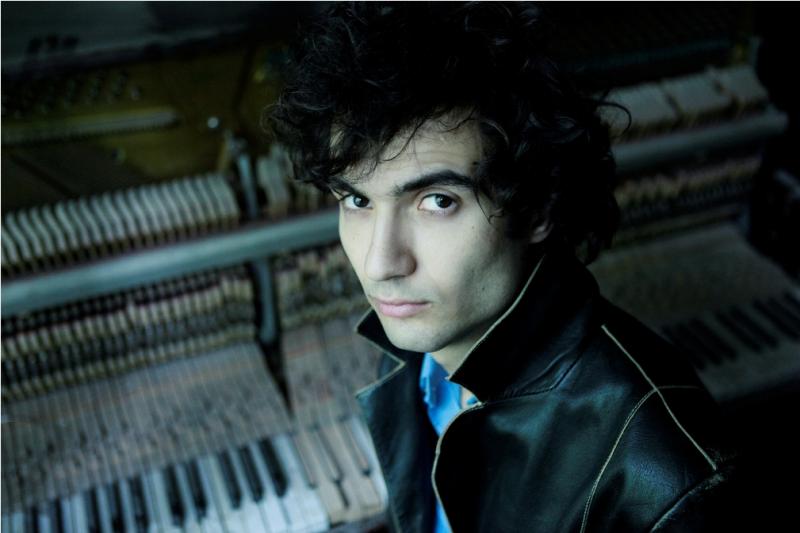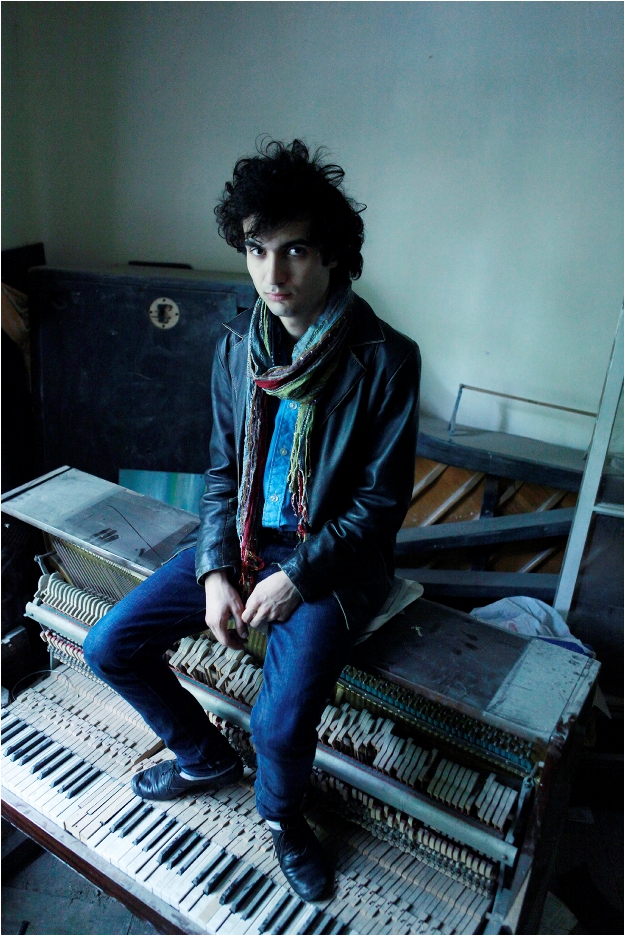Interview: Tigran | reviews, news & interviews
Interview: Tigran
Interview: Tigran
The bright new Armenian piano star opens the London Jazz Festival

Tigran Hamasyan is a brilliant jazz pianist who is clearly on the rise – for one thing, like many a star before him, he has dropped his surname, and is now, according to his latest record The Fable, simply Tigran. When I meet him in London, he tells me one reason he became addicted to the acoustic piano as a child was that there were so many blackouts in his native Gyumri in Armenia, and it was something he could play by candlelight.
Tigran’s parents – his father was a jeweller and his mother a clothing designer - would queue at five in the morning for hours for bread of dubious quality. “When the electricity came on, my sister would start crying as it was so unusual,” he recalls. The first music he fell in love with in the middle of this post-apocalyptic atmosphere was heavy metal, and he says he still loves Meshuggar, the Swedish Death Metal band (authors of “the heaviest songs ever written - rhythmically, it’s insane”) as much as Ravel or Thelonious Monk.
He was enrolled at a classical school aged five. “For years it was just a chore. My mum made me practise, but as soon she turned away I started improvising and coming up with cheesy songs.” While most classical musicians don’t improvise “it was my thing, I didn’t even know what jazz was. For me improvising is the deepest music, it’s where everything starts.” In his teens, a jazz-loving uncle introduced him to pianists like Fats Waller. Tigran has a hand-span which reaches from C to the E flat an octave-and-a-bit above, which makes it that much easier to play the minor, melancholy chords that infuse his music.
When he was 16, his parents moved to Los Angeles to give their two children (Tigran’s sister is a painter and sculptor) better artistic opportunities. Tigran began to win a series of piano competitions and met saxophonist Ben Wendell and drummer Nate Wood, who still play with him today.
The other reason you can tell Tigran is on a vertiginous ascent is that fellow jazz pianists like Herbie Hancock, Chick Corea and Brad Mehldau have all raved about him, and he recently made his TV debut on Later With Jools (when was the last time you saw solo jazz piano on that programme?) He was even played on theartsdesk radio show.
His last album The Fable (see video, next page), is mainly solo piano, with snatches of singing and humming, and is an immensely poised masterwork with sparkling melodies, veering between introspective romanticism and expansive virtuosity. Of all his albums, this one has the most of his native Armenian influence. There’s a take of the standard “Someday My Prince Will Come” and an Armenian medieval hymn, with most of the rest being new compositions, improvising around Armenian scales, which gives the whole a certain mysterious East-West quality.
Of his spiritual search he says 'Every time I think about it I realise I know nothing.'
Geoff Dyer in his jazz book But Beautiful suggests that the future of jazz will come from such fusions of culture, and this is an exemplary specimen. One of the most enigmatically beautiful tracks is "The Spinner", a hauntingly melodic composition by the mystic (and conman, depending on your point of view) George Gurdjieff arranged by Thomas de Hartmann (see video, next page). Gurdjieff, the author of Meetings With Remarkable Men, would hum his tunes to the pianist Hartmann; for Tigran it is “absolutely timeless, incredible music.” Tigran says he believes in God, and like his musical “gods” Herbie Hancock and Wayne Shorter is also interested in Buddhism. Of his spiritual search he says “Every time I think about it I realise I know nothing.”
Now he is becoming an international star, he is feted back in Armenia, but is depressed by the Armenian pop music - “Some of the songs include Armenian instruments, but it’s really rubbish.” He does rate the other best known musician in Armenia, Djivan Gasparian (who plays the oboe-like duduk), who he says has “bardic” qualities.
 Tigran (pictured right) loves playing in classical venues, like the Wigmore Hall, where he performs on Friday as the opening act of the London Jazz Festival (he plays Brighton on Thursday), but says he is hugely envious of the spontaneity of the village musicians of Armenia. “I read something that had me almost in tears yesterday by this ethnomusicologist Komitas, who collected Armenian folk music a century ago. There’s a village he went to when they were on a summer pilgrimage and someone sang a simple melody, and that melody evolved spontaneously on the spot with the other villagers into something super-complicated. Then they go and get the best singer in the village to sing a top line and Komitas wrote everything down. The way he described it, it was like the birth of music itself.”
Tigran (pictured right) loves playing in classical venues, like the Wigmore Hall, where he performs on Friday as the opening act of the London Jazz Festival (he plays Brighton on Thursday), but says he is hugely envious of the spontaneity of the village musicians of Armenia. “I read something that had me almost in tears yesterday by this ethnomusicologist Komitas, who collected Armenian folk music a century ago. There’s a village he went to when they were on a summer pilgrimage and someone sang a simple melody, and that melody evolved spontaneously on the spot with the other villagers into something super-complicated. Then they go and get the best singer in the village to sing a top line and Komitas wrote everything down. The way he described it, it was like the birth of music itself.”
- Tigran appears at Komedia, Brighton on Thursday and the Wigmore Hall on Friday on the opening night of the London Jazz Festival.
Listen to A Fable by Tigran
Watch Tigran playing 'The Spinners'
Explore topics
Share this article
The future of Arts Journalism
You can stop theartsdesk.com closing!
We urgently need financing to survive. Our fundraising drive has thus far raised £49,000 but we need to reach £100,000 or we will be forced to close. Please contribute here: https://gofund.me/c3f6033d
And if you can forward this information to anyone who might assist, we’d be grateful.

Subscribe to theartsdesk.com
Thank you for continuing to read our work on theartsdesk.com. For unlimited access to every article in its entirety, including our archive of more than 15,000 pieces, we're asking for £5 per month or £40 per year. We feel it's a very good deal, and hope you do too.
To take a subscription now simply click here.
And if you're looking for that extra gift for a friend or family member, why not treat them to a theartsdesk.com gift subscription?
more New music
 The Last Dinner Party's 'From the Pyre' is as enjoyable as it is over-the-top
Musically sophisticated five-piece ramp up the excesses but remain contagiously pop
The Last Dinner Party's 'From the Pyre' is as enjoyable as it is over-the-top
Musically sophisticated five-piece ramp up the excesses but remain contagiously pop
 Moroccan Gnawa comes to Manhattan with 'Saha Gnawa'
Trance and tradition meet Afrofuturism in Manhattan
Moroccan Gnawa comes to Manhattan with 'Saha Gnawa'
Trance and tradition meet Afrofuturism in Manhattan
 Soulwax’s 'All Systems Are Lying' lays down some tasty yet gritty electro-pop
Belgian dancefloor veterans return to the fray with a dark, pop-orientated sound
Soulwax’s 'All Systems Are Lying' lays down some tasty yet gritty electro-pop
Belgian dancefloor veterans return to the fray with a dark, pop-orientated sound
 Music Reissues Weekly: Marc and the Mambas - Three Black Nights Of Little Black Bites
When Marc Almond took time out from Soft Cell
Music Reissues Weekly: Marc and the Mambas - Three Black Nights Of Little Black Bites
When Marc Almond took time out from Soft Cell
 Album: Mobb Deep - Infinite
A solid tribute to a legendary history
Album: Mobb Deep - Infinite
A solid tribute to a legendary history
 Album: Boz Scaggs - Detour
Smooth and soulful standards from an old pro
Album: Boz Scaggs - Detour
Smooth and soulful standards from an old pro
 Emily A. Sprague realises a Japanese dream on 'Cloud Time'
A set of live improvisations that drift in and out of real beauty
Emily A. Sprague realises a Japanese dream on 'Cloud Time'
A set of live improvisations that drift in and out of real beauty
 Trio Da Kali, Milton Court review - Mali masters make the ancient new
Three supreme musicians from Bamako in transcendent mood
Trio Da Kali, Milton Court review - Mali masters make the ancient new
Three supreme musicians from Bamako in transcendent mood
 Hollie Cook's 'Shy Girl' isn't heavyweight but has a summery reggae lilt
Tropical-tinted downtempo pop that's likeable if uneventful
Hollie Cook's 'Shy Girl' isn't heavyweight but has a summery reggae lilt
Tropical-tinted downtempo pop that's likeable if uneventful
 Pop Will Eat Itself's 'Delete Everything' is noisy but patchy
Despite unlovely production, the Eighties/Nineties unit retain rowdy ebullience
Pop Will Eat Itself's 'Delete Everything' is noisy but patchy
Despite unlovely production, the Eighties/Nineties unit retain rowdy ebullience
 Music Reissues Weekly: The Earlies - These Were The Earlies
Lancashire and Texas unite to fashion a 2004 landmark of modern psychedelia
Music Reissues Weekly: The Earlies - These Were The Earlies
Lancashire and Texas unite to fashion a 2004 landmark of modern psychedelia

Add comment